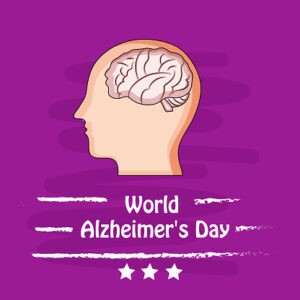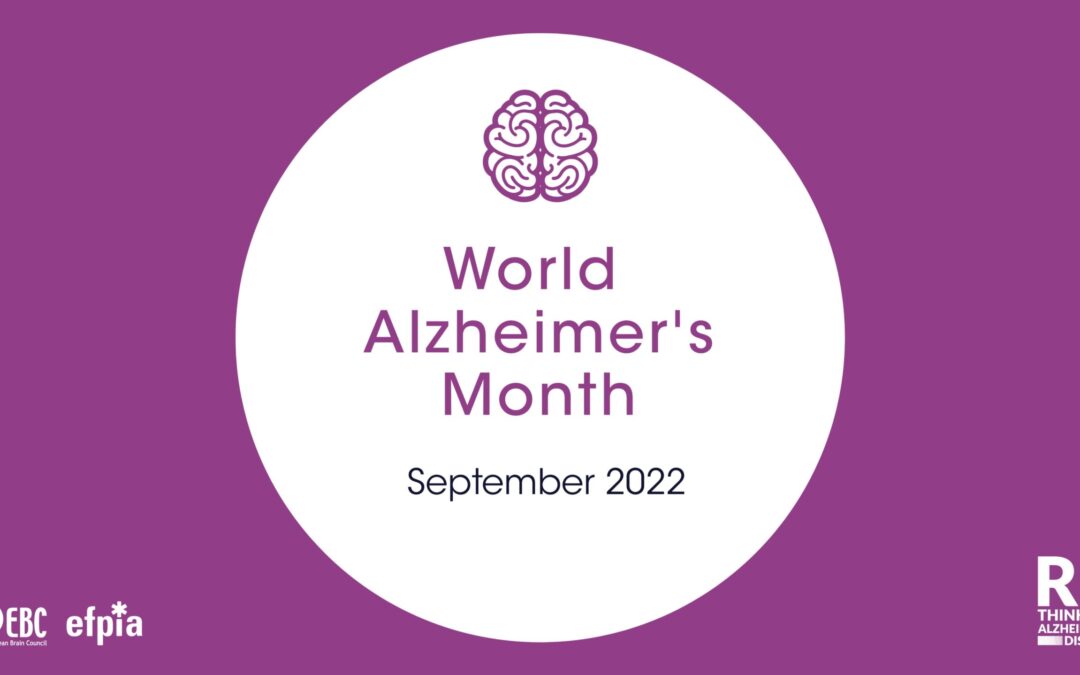
illustration of World Alzheimers Day Background
By Debbie Hommel, ACC/MC/EDU, CTRS
As care providers in the long-term care continuum, we often see and hear about statistics related to the rising numbers of individuals with Alzheimer’s Disease (AD). One common statistic states that someone in the United States develops Alzheimer’s every 67 seconds. By the year 2050, that time will be cut in half with one person developing AD every 33 seconds. Our role in this serious chain of events is twofold: one of advocacy and the other being a care provider.
September is World Alzheimer’s Month, as established by the Alzheimer’s Disease International (ADI) organization. ADI is an international federation of Alzheimer’s associations from around the world. The ADI’s mission is to globally focus attention on AD and provide resources to the associations and care givers from around the world. ADI introduced World Alzheimer’s Day to raise awareness and reduce the stigma related to AD. The theme for this year’s World Alzheimer’s Month is Know Dementia, Know Alzheimer’s. The theme emphasizes support for those diagnosed with the disease as well as their families. The ADI website is an excellent resource, offering information on international initiatives, research and education related to AD. Check it out at http://www.alz.co.uk/
Within the United States, the Alzheimer’s Association is a strong advocacy and education association. Many areas sponsor Walk to End Alzheimer’s in September and October, as well as throughout the rest of the year. Health care professionals and care facilities can create teams to raise funds for the Alzheimer’s Association through these walks. You can identify local walks in your area; find a team or information as how to start your own team at http://act.alz.org/site/PageServer?pagename=walk_about
”
In honor of World Alzheimer’s Day – here are five helpful hints to guide you in your work with elders living with dementia.
- Never stop learning all you can about the New information is available daily on Alzheimer’s Disease, the changes to the brain as well as new methods of diagnosis and treatment. Seek out this information daily. Attend classes. Read articles and feed your brain with as much good information you can manage. Knowledge is power and the more we know about this diagnosis, the better able we will be to respond to the people living with AD. A great place to start is the Alzheimer’s Association web site – http://www.alz.org/alzheimers_disease_1973.asp
- Become dementia-capable which is being skillful in understanding and working with individuals with Dementia-capable people practice empathy, striving to see the world through the eyes of the individual living with Alzheimer’s Disease. If we can understand their perspective, we can alter our approach, so it is better understood by the person living with AD. Listening more to the individual’s words and behavior is a key component of being dementia-capable.
- Know the person. It used to be said that Alzheimer’s disease creates a loss of person or personhood. We now know that it is not true. Very often, the “essence” of the person remains – their sense of humor, their ability to show affection, and various personality traits. Glen Campbell, the award-winning song writer and singer, demonstrated this in the documentary “I’ll be Me”. As his speech and cognitive skills faded away, his sense of humor and personality traits remained intact. It is important for every care giver to look into the eyes of our elders and find the person within.
- Believe that the behavior is always right. Challenging behaviors are often defined as a problem when working with elders living with Alzheimer’s If we would look at all behaviors as an expression, they may be less problematic. Behaviors are a form of communication, whether it is expressing discomfort, fear, anger or loneliness – the behavior is expressing something. The job of the caregiver is to interpret that expression and respond as needed.
- Almost anything can be an activity. The definition of “activity” is any endeavor the elder participates in (other than ADL’s) that are intended to enhance the person’s sense of well-being or to promote social, physical, cognitive and emotional health. Activities are often seen as structured groups led by activity professionals which is only one part of the equation. Individuals living with Alzheimer’s and related dementias sometimes have difficulty remaining within groups for extended periods of time. This requires broadening our scope of activity into daily tasks, with all staff engaging the elder in some way. With dementia-capable staff, this is possible and can contribute significantly to a better quality of life for all. With consistent education, both self-directed and in a structured setting, we can advocate for appropriate care and services for our elders with Alzheimer’s Disease – not only during World Alzheimer’s Month but every day.
Here are some helpful educational resources:
*Helpful Links on dementia resources
Individualized Dementia Care 8.5 Hour NCCAP Pre-approved Independent Study Program
Additional Memory Care Training Programs

